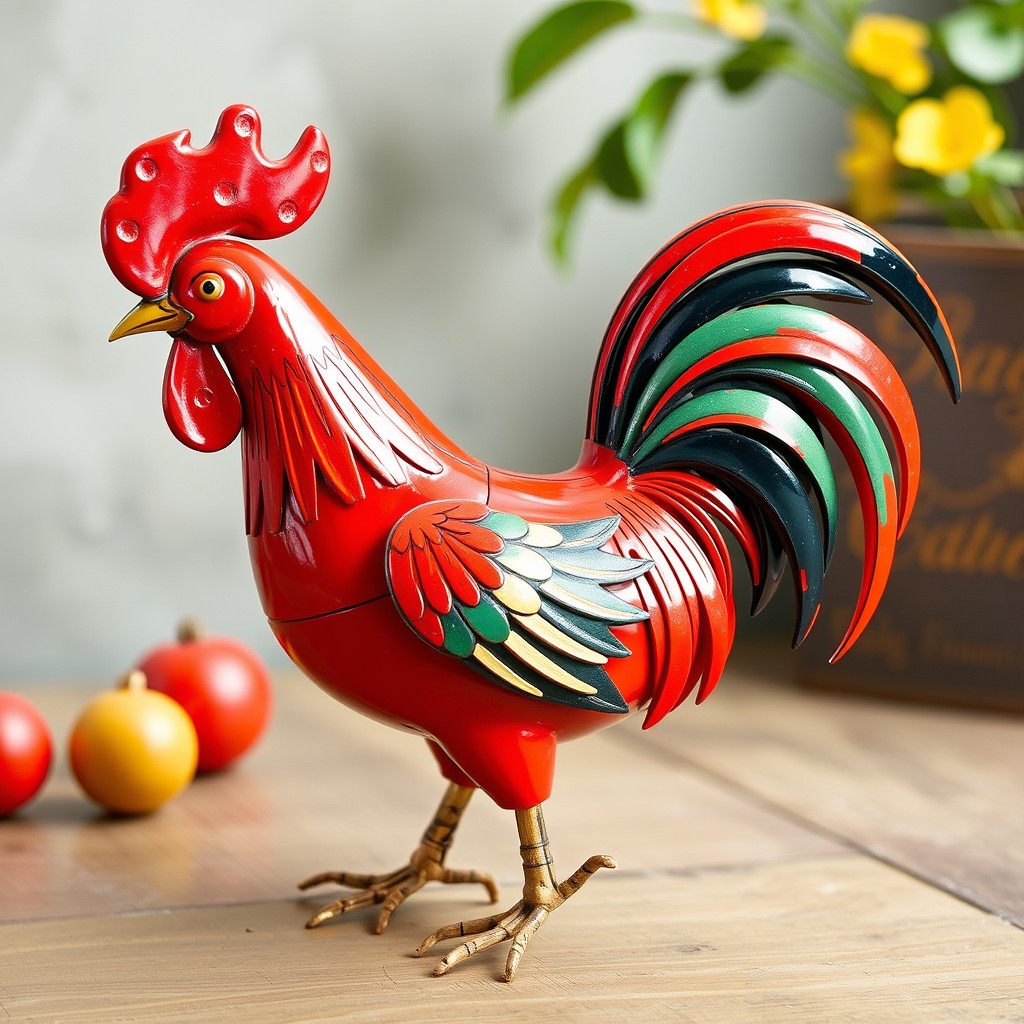Caring for Your Dancing Red Rooster
Practical techniques from Paris experts—handling, cleaning, storing, and preserving vintage mechanical rooster toys for generations to come.
Daily Care & Handling
Proper Handling
Always use clean hands when picking up your toy—skin oils can trigger corrosion. Lift from underneath rather than gripping parts, especially around the spring housing or fragile tin edges.
Quick Inspection
With each use, check for loose screws, misalignment, or unusual sounds. Pay close attention to the wind-up key tension and the smoothness of the dance. Early detection prevents costly restoration.
Daily Care Checklist
- • Handle with clean hands
- • Support base, avoid stress on parts
- • Keep fingers away from gears
- • Inspect paint and enamel for chips
- • Listen for smooth escapement
- • Check key & spring tension
- • Note changes in motion or sound

Cleaning & Maintenance
Exterior Surfaces
Use a soft dry brush for dust. For stubborn marks, apply a lightly damp microfiber cloth with neutral soap, away from moving parts. Never scrub enamel or decals.
Mechanical Components
Avoid liquids—use compressed air to clear dust. If movement stiffens, consult a restorer for proper lubrication. DIY oils often trap dirt and shorten lifespan.
Proper Storage
Environment
Keep toys in a cool, stable space—40–60% humidity, away from direct sunlight. Avoid attics and basements with extreme fluctuations. Acid-free boxes or glass cases offer the best protection.
Light & Display
UV light fades enamel and fabric accents. Use LED lighting and rotate displayed toys to prevent uneven fading.
Storage Checklist
- • Cool, dry room
- • Stable humidity (40–60%)
- • Away from direct sun
- • Acid-free wrapping
- • UV-filtered display case
- • Rotate items regularly
Regular Operation
Gently wind and run the toy every few months. Let it unwind fully before rewinding. This spreads lubricant and keeps the spring active. Never over-wind—the tension can snap the mainspring.
Warning Signs
If you hear scraping, feel resistance, or notice shorter run-times, stop immediately. Forcing a jammed spring can cause irreparable cracks. Seek professional help early.
Common Issues
Spring Fatigue
With age, mainsprings lose elasticity. Restorers can replace them with hand-made replicas, but it’s delicate work requiring specialist tools.
Dust & Debris
Fine particles add drag to cams and gears. Professional ultrasonic cleaning restores smooth cadence without harming enamel.
Prevention Tips
- • Run mechanism gently
- • Avoid dusty storage
- • Never over-wind
- • Monitor humidity
- • Clean hands only
- • Inspect monthly
When to Call a Professional
Mechanical failure, cracked enamel, or missing parts should never be addressed at home. Seek restorers experienced with rooster toys—request references and before/after examples.
Choosing a Restorer
Look for specialists in vintage tin and spring toys. Good restorers explain their methods, provide estimates, and prioritize authenticity over “like-new” appearance.
Professional Services
- • Spring replacement
- • Cam & gear repair
- • Enamel conservation
- • Value appraisals
- • Authentication checks
Immediate Response
If your rooster toy suffers damage, stop winding, support it securely, and document the issue with photos. Contact a professional quickly to avoid worsening the damage.
Preventing Further Harm
Protect from dust and humidity. Store flat, avoid handling, and never attempt to operate a damaged spring until a restorer has assessed it.
Recommended Care Schedule
Daily
Gentle handling, quick check for loose parts, proper storage.
Weekly
Light dusting, test wind-up, listen for irregularities.
Monthly
Review storage conditions, update documentation, photograph condition changes.
Annual Care
- • Professional inspection
- • Deep clean if needed
- • Spring & cam evaluation
- • Insurance appraisal update
- • Collection documentation
Need Expert Advice?
Our Paris-based team offers consultations, professional restoration, and personalized care strategies for your Dancing Red Rooster.
